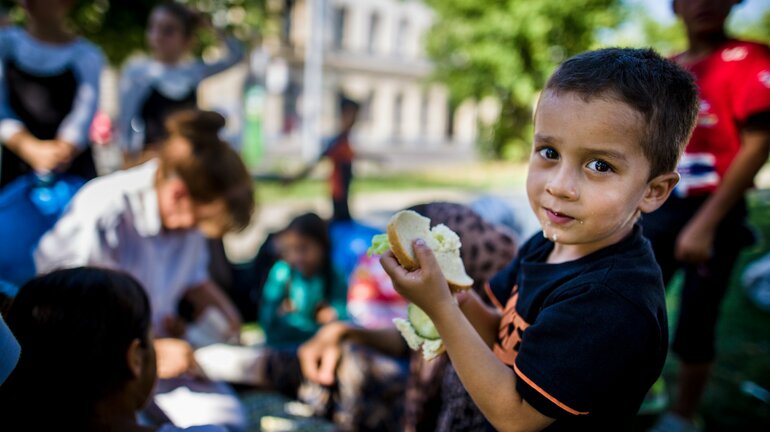Emergency volunteers

In the context of the European Commission’s legal proceedings against Hungary, the country’s refugee policies have lately been pulled back into the spotlight. Since the refugee crisis in summer 2015, NGOs and lawyers have criticised asylum procedures in Hungary for violating international human rights frameworks. By building a fence along the Hungarian-Croatian border and creating a new force of ‘border hunters’, the government has ended the mass inflow of asylum seekers and migrants into Hungary.
In summer 2015, Hungary’s government directed vast numbers of refugees to Budapest instead of taking them to one of the reception centres across the country. That decision created an emergency situation at train stations, most famously Budapest’s Keleti station. The situation was accompanied by an anti-migrant media campaign and a government-run billboard campaign. The Hungarian government used the refugees at Budapest’s railway stations to stoke racist sentiments among the population and communicate that Hungary was not able or willing to host refugees (see also TARKI 2016).
Polls and a 2016 referendum on migrant quotas have since shown this strategy to be effective with the majority of the population. But an unprecedented number of people also helped the refugees. At Budapest’s Keleti station in summer 2015, volunteers acted on human rights principles when the government failed to provide the most essential support. Helpers played with children, gave advice, handed out food, and supplied medical assistance. Including helpers at other volunteer sites in Hungary, several thousand are estimated to have contributed to the refugee help movement (TARKI 2016). Considering the severe lack of trust and high levels of xenophobia in Hungary, as well as the generally low levels of volunteer work in post-socialist countries, the large number of activists is puzzling.
Who were those people? Why did they decide to help
In non-representative surveys on the composition of volunteers in the refugee crisis, the majority were shown to be educated women. Other studies have emphasised the high percentage of volunteers with a Jewish background (TARKI 2016). Through in-depth interviews with refugee helpers born in Hungary, held between August 2015 and September 2016, I further investigated the life stories, value systems, and motives of volunteers in Hungary’s 2015 refugee crisis.
Trust and value systems
Interpersonal trust values were much higher among the respondents than in the general Hungarian population, according to the European Social Survey, while trust in institutions, politicians, and political parties was similarly low and trust in the Hungarian government was even lower. The sample was pro-EU, with the highest trust expressed for the European Parliament. On an individual level, some respondents were members of the cosmopolitan, pro-Western elite: they had attended elite schools, had outstanding positions in their fields of work in academia or culture, and enjoyed high levels of social, cultural, and economic capital. All respondents were open to other cultures, having had contact with non-Hungarians while in education, during international volunteering, in their work in international companies, in their own families, or when sharing their homes with travellers through couch surfing.
Motivations for volunteering
Political opinions in opposition to the Fidesz government were widespread, although not uniform, among the respondents, but politics were rarely mentioned as a motivation. What motivated people to action were humanistic intentions and experiences of hardship. Among the traditional, conservative helpers, some of them former Fidesz voters, the extent of the anti-refugee campaign clashed with their humanistic or religious worldviews. Social responsibility and solidarity were vital motivators, especially for respondents in elite positions. Hungary’s socialist past came up in all interviews: experiences of hardship, discrimination, and a lack of freedom in their own or their families’ past contributed to their willingness to help. For volunteers with a Jewish background, the Holocaust and the suppression of Jewish culture during Soviet times were relevant issues. In addition, community involvement in the revived Jewish communities after 1989 appears central in the tendency to volunteer.
Refugee help and civil society
All respondents described first helping refugees individually, for example during their daily commutes, at train stations. Some helpers were taken to volunteer sites by friends or relatives. Existing organisations such as Menedék – Hungarian Association for Migrants or MigSzol – Migrant Solidarity pooled helpers to these sites. Volunteers also formed a large grassroots movement around the issue, employing social media as a recruitment and network tool. New groups such as Migration Aid (MA) and Segítsünk Együtt a Menekülteknek (SEM) (‘Let’s help the refugees together’) were formed, and their Facebook pages attracted over 10,000 members each (TARKI 2016).
Much of the grassroots activity died down after the number of refugees sunk rapidly in autumn of 2015, groups existing prior to the crisis continue with their work fuelled with new volunteers and project ideas. The biggest grassroots groups SEM and MA, redirected their activity to supporting the poor (‘Let’s help together’) and integrating refugees who stayed in Hungary (Keleti Group, Helpers by Heart) (TARKI 2016).
Though respondents did not see much hope for a united opposition during the 2016 referendum, helpers and refugees they mentor supported the Two-Tailed Dog Party (Magyar Kétfarkú Kutya Párt, MKKP) in its campaign to reduce the significance of the referendum, undermining the Fidesz strategy to use the vote to oppose binding EU refugee frameworks.
Two years later, about half of the respondents are still active, for example organising intercultural youth camps or mentoring individual refugees on a daily basis. Others keep in touch to discuss political developments and join manifestations such as the recent protest against the planned closure of the Central European University.
Hannah Heyenn is an associate researcher at the international research project PREWORK. This article is mainly based on her own research.